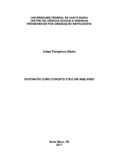| dc.creator | Diebe, Edsel Pamplona | |
| dc.date.accessioned | 2018-05-09T13:03:22Z | |
| dc.date.available | 2018-05-09T13:03:22Z | |
| dc.date.issued | 2017-03-10 | |
| dc.identifier.uri | http://repositorio.ufsm.br/handle/1/13141 | |
| dc.description.abstract | Peter Abelard (1079-1142) presented two different conceptions about faith (fides) in the Theologia Scholarium: as opinion (existimatio) of things not apparent and as proof (argumentum) of things not apparent. Our thesis is that, despite Abelard understand the faith as existimatio and as argumentum, there is no contradiction between the position defended in ethic and in logic. We tried to solve the problem based on the understanding that Abelard has of human individual in his relation to faith as opinion and as proof. In logic, we will evaluate the individual’s conception based on the relation between the singulars and the universal; and in ethics, we will investigate this notion from the idea of “moral’s intention”. We also propose a brief etymological analysis of term existimatio in its origin of the Roman Law and its ingress in the works of Abelard in 12th century. We will still present the main repercussions that the term has on the discussions of the Council of Sens, in 1140. Finally, we will present three main results about abelardian ethic which we are defenders: a) the ethic is the faith or the belief and as in Augustine, comes before the purely rational understanding; b) the ethic is consent or assent in which the human individual sins according with their intentions; and c) the ethic is free will, for the individual who believes for Abelard is that endowed with existimatio. We argue that this last aspect of abelardian ethic it keep away from the criticism of subjectivism received from the monastic tradition. We maintain, beside this, that the true freedom for Abelard consists in to follow his own will, provided that the same is in accordance with the divine will. | eng |
| dc.description.sponsorship | Coordenação de Aperfeiçoamento de Pessoal de Nível Superior - CAPES | por |
| dc.language | por | por |
| dc.publisher | Universidade Federal de Santa Maria | por |
| dc.rights | Attribution-NonCommercial-NoDerivatives 4.0 International | * |
| dc.rights.uri | http://creativecommons.org/licenses/by-nc-nd/4.0/ | * |
| dc.subject | Pedro Abelardo (1079-1142) | por |
| dc.subject | Ética | por |
| dc.subject | Indivíduo | por |
| dc.subject | Consentimento | por |
| dc.subject | Existimatio | por |
| dc.subject | Ethic | eng |
| dc.subject | Individual | eng |
| dc.subject | Consent | eng |
| dc.subject | Existimatio | eng |
| dc.title | Existimatio como conceito ético em Abelardo | por |
| dc.title.alternative | Existimatio as ethical concept in Abelard | eng |
| dc.type | Tese | por |
| dc.description.resumo | Pedro Abelardo (1079-1142) apresentou duas concepções diferentes acerca da fé (fides) na Theologia Scholarium: como opinião (existimatio) das coisas não aparentes e como prova (argumentum) das coisas não aparentes. Nossa tese é que, apesar de Abelardo compreender a fé como existimatio e como argumentum, não há contradição entre a posição defendida na ética e na lógica. Tentamos solucionar o problema com base no entendimento que Abelardo tem de indivíduo humano, em sua relação com a fé como opinião e como prova. Na lógica, avaliaremos a concepção de indivíduo com base na relação entre os singulares e o universal; e na ética, investigaremos essa noção a partir da ideia de “moral da intenção”. Propomos também uma breve análise etimológica do termo existimatio em sua origem no Direito Romano e seu ingresso nos trabalhos de Abelardo no século XII. Apresentaremos ainda as principais repercussões que o termo teve nas discussões do Concílio de Sens, em 1140. Por fim, apresentaremos três resultados principais a respeito da ética abelardiana da qual somos defensores: a) a ética é a fé ou a crença e, tal como em Agostinho, vem antes da compreensão puramente racional; b) a ética é consentimento ou assentimento em que o indivíduo humano peca de acordo com suas intenções; e c) a ética é livre-arbítrio, pois o indivíduo que crê para Abelardo é aquele dotado de existimatio. Defendemos que esta última vertente da ética abelardiana se mantém longe da crítica de subjetivismo recebida da tradição monástica. Sustentamos, ao lado disso, que a verdadeira liberdade para Abelardo consiste em seguir a própria vontade, desde que a mesma esteja de acordo com a vontade divina. | por |
| dc.contributor.advisor1 | Rossatto, Noeli Dutra | |
| dc.contributor.advisor1Lattes | http://lattes.cnpq.br/2947312243186882 | por |
| dc.contributor.referee1 | Sautter, Frank Thomas | |
| dc.contributor.referee1Lattes | http://lattes.cnpq.br/2804652028967760 | por |
| dc.contributor.referee2 | Silva, José Lourenço Pereira da | |
| dc.contributor.referee2Lattes | http://lattes.cnpq.br/8133358460835506 | por |
| dc.contributor.referee3 | Cenci, Márcio Paulo | |
| dc.contributor.referee3Lattes | http://lattes.cnpq.br/9389581445080354 | por |
| dc.contributor.referee4 | Leite Junior, Pedro Gilberto da Silva | |
| dc.contributor.referee4Lattes | http://lattes.cnpq.br/2209475290542494 | por |
| dc.creator.Lattes | http://lattes.cnpq.br/2368032893517094 | por |
| dc.publisher.country | Brasil | por |
| dc.publisher.department | Filosofia | por |
| dc.publisher.initials | UFSM | por |
| dc.publisher.program | Programa de Pós-Graduação em Filosofia | por |
| dc.subject.cnpq | CNPQ::CIENCIAS HUMANAS::FILOSOFIA | por |
| dc.publisher.unidade | Centro de Ciências Sociais e Humanas | por |



